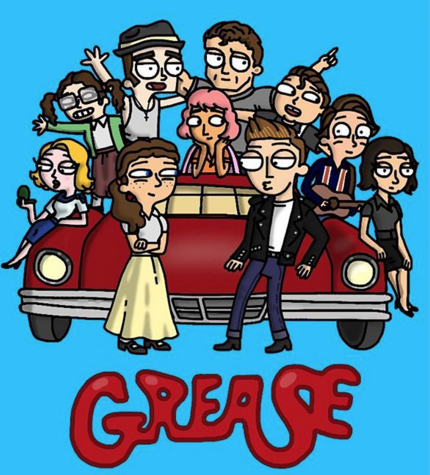The History of Grease
Cast member Genevieve Wisdom delves into the history of the Grease script and City High’s upcoming performance of it.

With the spring musical Grease well underway, people are buzzing with excitement. Walking down the hallway, you can hear cast members and potential audience members alike singing the most popular songs from the movie. But are these songs the same as in the beloved movie? The musical Grease has undergone significant script changes through the many productions. The City High production differs from the well-loved movie in quite a few ways. Here’s a breakdown of some of the biggest revisions made throughout the years:
Grease premiered on Broadway in 1972. It included less popular songs such as “Freddy My Love”, “Those Magic Changes”, and “Rock and Roll Party Queen”. It was also described as significantly darker and grittier than the peppy version we’re all used to. However, when the 1978 film was made, they added songs like “You’re the One that I Want”, “Grease”, and “Hopelessly Devoted to You”, which was written for Olivia Newton-John’s contractual obligation to have a solo. The director of the movie, Randal Kleiser, didn’t like these songs at first, because he didn’t think they followed the ‘50’s style of the show. However, the songs became instant chart-topping hits, and have been added into Broadway productions, since the revival in 1994. Productions have also started calling the male gang of Danny and his friends “The T-Birds”, as opposed to the original “Burger Palace Boys”.
The story of Grease has always appealed to teenagers; the romance, peer pressure, and friendships all relate to our lives, not to mention the main characters being in high school themselves. Because of this, high schools all over the country choose to perform it as their musical. In fact, Grease has been one of the top six most performed musicals for high schools since the 1980’s. However, many critics deem it inappropriate for high schoolers, which prompted the need for a cleaned-up, “school version” of the script. In the original school version, they kept all of the songs except Rizzo’s ballad, “There Are Worse Things I Could Do”, and they cut all mentions of alcohol or smoking, which are abundant throughout the original. They also throw out the entire plot line of Rizzo’s pregnancy scare, and any swearing or bad language.
Our directors chose not to use the school version of the script. This version of the script, chosen by Troy and Havilah Peters, and Doug Lestina, includes a balance of original aspects of the first Broadway production, and new, well-known aspects from the hit movie.
“There’s a couple different songs and scenes,” stage manager Elisa Swanson ‘17 said . “But for the most part the stage version and the movie are very similar.”
The version we’re performing includes songs from the Broadway shows not in the movie like “Freddy My Love”, and “Rock and Roll Party Queen”, along with the new ones like “You’re the One That I Want”, and old favorites like “Summer Nights”. Certain small things are different between the movie plot and the plot of city high’s production, such as where certain things take place or where songs are located in the story. For example, the iconic song, “We Go Together,” is at the end of Act 1, and the finale, where most people expect it. The small, supporting roles of the other Greasers and Pink Ladies are significantly larger in the stage version; Kenickie sings all of Greased Lightning, and many other smaller roles have solo or duet songs. Additionally, Rizzo’s emotional ballad, “There Are Worse Things I Could Do,” is sung entirely to Sandy. However, all of the important, famous plot points we’re so familiar with are maintained.
“The overall fun, energetic mood of the stage version is the same as the movie and it’ll be just as enjoyable,” Swanson said.
Your donation will support the student journalists of Iowa City High School. For 2023, we are trying to update our video and photo studio, purchase new cameras and attend journalism conferences.

Hello and welcome to my life. My existence revolves around Chonk day, a lovely holiday that is celebrated every week on the day my peasants refer to as...






























